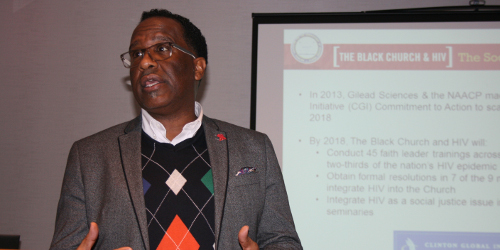
Rev. William Francis of Atlanta, who identified himself as HIV-positive, moderated the meeting. BTL photo: Jason A. Michael
DETROIT – Through their program, "The Black Church & HIV: The Social Justice Imperative," the NAACP hosted a town hall for Detroit faith leaders on Thursday, Dec. 17 in the Marquette Room of the Detroit Marriott. The luncheon, which was produced in partnership with the Council of Baptist Pastors of Detroit, drew a small crowd of about 35, of which about a dozen identified as clergy.
Rev. Horace Sheffield III, pastor of New Destiny Christian Fellowship Church, spoke about how he got involved with fighting HIV while living in New York.
"I recognized there was a great deal of judgment going on," he said. "Some of our local clergy and national clergy issued a statement that this was a consequence of sin. It was God's judgment of people for their lifestyle."
But Sheffield did not believe that.
"Morality as it relates to sex is not the issue," he said. "The issue is if we didn't address HIV/AIDS, our community would be so imperiled we wouldn't be here."
Sheffield started a program called "Death Can Wait."
"We had a real problem with the fact that our own community was not addressing this issue," he said. "We're all going to die. But we have a responsibility to postpone the event. And how do you do that? You know your status.
"I love Jesus," Sheffield continued. "I really do. And most people I know love Jesus. But they still have sex."
Sheffield said he has no tolerance for ministers who sit in judgment on this issue.
"I still rebuke pastors who want to blame folks … I said you want to blame people for this? Who do I blame for your ignorance? Who is responsible doesn't matter? The moral aspects of this (disease) do not matter. Churches have to simply side with Jesus … all we're required to do is help those who need help. We've got to just respond to the needs of the people."
Rev. William Francis, an ambassador to the NAACP program from Atlanta, moderated the event and echoed Sheffield's sentiments.
"With HIV we always want to know who and how somebody got it," Francis said. "But with blood pressure we don't ask them if it's ham or pork. When they get diabetes (we don't ask them) was it pie or Patti Labelle's sweet potato pie. But with HIV we want to know the how and the why versus just focusing on the spirituality."
Offering some sobering statistics at the meeting was Dr. Abdul El-Sayed, the executive director and health officer for the city of Detroit.
"Seven thousand Detroiters live with HIV/AIDS, and 1,000 of them don't know they have it," El-Sayed reported. "Seventy-three percent of diagnoses of people with HIV in Southeastern Michigan are black and 94 percent of HIV/AIDS diagnoses in Detroit are black."
In his presentation, El-Sayed focused on how people contract the disease.
"HIV in this city is not simply about people behaving badly," he said. "HIV in the city is about poverty, it's about structural racism, it's about all the challenges that our communities face as a function of how decisions have been made regarding where resources go and what we ought to do about it. So, it's not an individual problem, it's a community problem. And we have to see it as such."
El-Sayed said that while he is Muslim, he also drew "inspiration" from the Christian face and read from the Bible, Matthew 10:8.
"'Heal the sick, raise the dead, cleanse the lepers, cast out the demons,'" El-Sayed said. "This particular verse is so powerful … HIV is like the leprosy of our time."
Rev. Keron Sadler, from the NAACP Health Department, spoke about the power that black pastors have to help curb the rising number of infections in their community.
"The church can be a very hurtful place, but what the church is, is a very powerful place," she said. "It's a place where the leadership has the power to influence.
"HIV is a movement," Sadler continued. "We need as many pastors onboard with us moving this movement forward as we normalize testing, decrease stigma by dispelling the myths and get people into care because they know their status."
Sadler encouraged clergy to download the free packet of information that can be found at www.theblackchurchandhiv.org and explained that the NAACP program contained a three prong approach that included faith leader training, denomination leadership engagement and seminary courses. Sadler said that black clergy have a responsibility to address the epidemic in their community.
"We pull the race card," she said. "(We say) nobody cares about us because we're black. Well, when are we gonna care about us? When we realize there is power in our voice and our numbers … we may be a minority but we have a majority voice. And when we realize that we create our own change, we create our own justice. But it really is up to us."
The Detroit town hall was part of a series sponsored by the NAACP. Earlier in the fall they visited Atlanta, Chicago and Dallas. Organizers of the meetings said they usually attract about 40-75 people in each city, and that they plan to expand the number of cities they visit next year.











